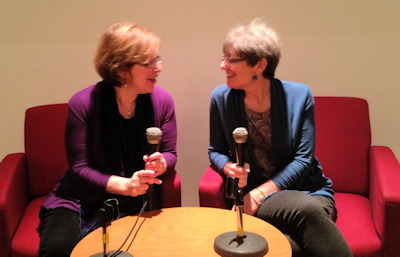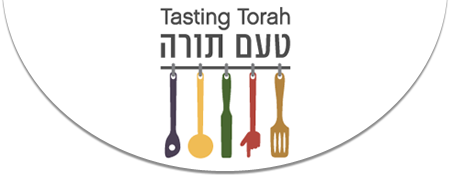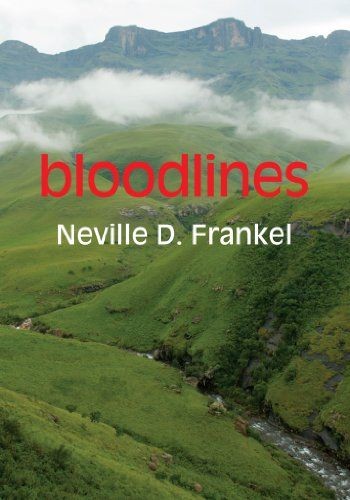Az men ken nit iberhar'n dos shlechteh, ken men dos guteh nit derleben.
If you can't endure the bad, you won't live to witness the good.
The Scene: Heaven. Babushki (grandmothers) are seated on folding bridge table chairs around a kitchen table. A bright yellow tablecloth erupting with red poppies covers the square table. Glasses of tea, sugar cubes, mandelbrot(Jewish biscotti), and poppy seed cookies are in front of each of the babushki. All are wearing sturdy shoes over their manicured toes. For the Russian babushki, floral print dresses bloom in competition with each other and the tablecloth. Grandma Rae, “the American,” wears her turquoise polyester pantsuit, the uniform of her Del Ray, Florida, senior complex. The Russian babushkis’ hair is styled with bobby pins, Grandma Rae has a short, sensible cut. The women have earned their wrinkles and their gray hair and are comfortable with themselves.
The actors:
Grandma Rae (the authors’ grandmother)
Baba Lyuba (Vera's grandmother)
Rosa (Alla’s grandmother)
Baba Lyuba: Rosa, why aren’t you Baba Rosa on the list of actors?
Rosa: Being called Baba or Babushka always made me feel old. So Alla just called me Rosa.
Grandma Rae: Okay, we’re all old now. Let’s have some tea and cookies and get to business. I never understood why my granddaughters are so interested in Russia. America is the best country in the world. Being American and being healthy is all you need. I left behind the old country of Russia while the anti-semite Tsar Nicholas II was still sitting on his tukhis in St. Petersburg and I thank God I did. But, even though I don’t understand it, I am so proud my granddaughters are working together to write this book. The book will be wonderful! The main thing is that they work so hard together but I also want they should have time with their families.
Baba Lyuba: Your granddaughters have to get this right. My Vera is a star. She has always been a star. I raised her to be special. Your granddaughters, poo, poo, poo, grew up with everything. My Vera made it all on her own.
Rosa: Alla was so serious always. Always she had to have things her way. Always she knew she had to leave Russia. She tried to protect us all. I am sorry I died before seeing her successful in Sweden. And what’s with this title—Jewish Luck?? Did Alla have luck, no! She made her own luck.
Baba Lyuba: Don’t you remember the film, Yiddishe Glickl (Jewish Luck) from the 1920s? All the actors, directors are here in heaven with us now. They’re in the shishka (big shot) section. It was a phrase we heard all the time. Of course, I’m too young to really remember the film well. We all have high school educations and I have higher education so we know about irony. This title is ironic. When we were growing up, yiddishe glickl meant because we were Jews, bad things happened: pogroms, then purges, then Nazis, then more purges. But our girls used their yiddishe kops (Jewish smarts) to bring themselves some luck.
Rosa. We helped, too. It wasn’t easy to stay alive. But we kept alive all those years to remind our girls that they needed to study, needed a profession. They needed to know about their past even though we had to whisper about it. In our family the children and grandchildren were married under a huppah. (Jewish wedding canopy) Do you know how dangerous that was? Our whole lives were one danger and then another. I suppose it was luck to survive and live to see granddaughters. Do you remember when we were children in the shtetl? We didn’t know there was a life outside. Outside were soldiers, Cossacks—dangers.
Baba Lyuba: Inside the shtetl we knew each other but to get an education—that was a trick! Can we all read and write?? It’s amazing we learned!
Rosa: It’s amazing we learned. It’s amazing we lived.
Grandma Rae: It’s not just luck, but common sense that kept us alive. I didn’t live in the shtetl. We were city people from Ekatrinaslav on the Dnieper River. When the pogrom came even to our city in 1905. Mama hid us all under down quilts in the closet. They didn’t come to us—we lived outside the Jewish quarter. But afterwards, Mama saw what happened and told Papa, “we’re leaving! We have family in Newark, New Jersey, USA.” Papa said the troubles would pass and then Mama said “we’re leaving”. The family left on the White Star ship. It was luck that we made it but Mama’s common sense that got us to move. By the way I never heard the phrase Yiddishe glickl once we got to the United States.
Rosa. So you think we didn’t have common sense? How much common sense do you think it took to survive the War, the Revolution. It took a lot of common sense I’ll tell you. Which side? Red? White? Who knew??
Baba Lyuba: That was nothing. What about surviving Stalin? Who knew when they would come for you? Black crows, voroni, everywhere.
Grandma Rae: Of course crows are black. You think the Communists invented that?
Rosa:. Oy, Rae. You are lucky to know so little. Black crows were the NKVD (Secret Police) cars come to take you to prison, to Siberia to the camps, to death. For nothing or for something. You were important one day, you were dead the next.
Baba Lyuba: Kirov. He would have fixed communism. It wasn’t so bad with Lenin. It was Stalin. But Stalin couldn’t take intelligent suggestions from Kirov in Leningrad. No, he had to kill Kirov.
Grandma Rae: Enough with the Stalin and the killing. Thank God, you all survived. Relax a little, drink a little tea, have a cookie.
Baba Lyuba. A cookie. What I wouldn’t have given for half a cookie during the 900 days the Nazis had us penned into Leningrad. They were starving us. Where were all of you in America? Were you Allies? Why not save us?
Rosa: And then the news—it started to come about what the Nazis were doing. We did have luck to be in Russia even with the siege. We were all hungry and starving together, not just Jews. Once Stalin died, all we could think about was our children marrying, being safe, and giving us grandchildren. Didn’t we all take care on our grandchildren, no communal daycare for our grandchildren! We had a chance to sing to them, to walk them outside everyday in the pram, to kiss their shayna punim. (beautiful faces)
Baba Lyuba: And even when they went to school, we could check they did their homework, make sure they had extra lessons like English, make sure there was food cooked for the family. The lines, standing in the lines. The job for us babushki. Rae, did you do that, too, in America?
Grandma Rae. Thank God, we had everything – meat everyday if we wanted. America had its own troubles. Tzuris, troubles that come from too much. But that’s another story.
Rosa: We have granddaughters that can take care of themselves, their children, their parents. We wish them long life, health, and strength. We can sit and drink tea in heaven in peace. They’re all still Jewish. We can call that Jewish Luck with a hearty dose of babushka help.




